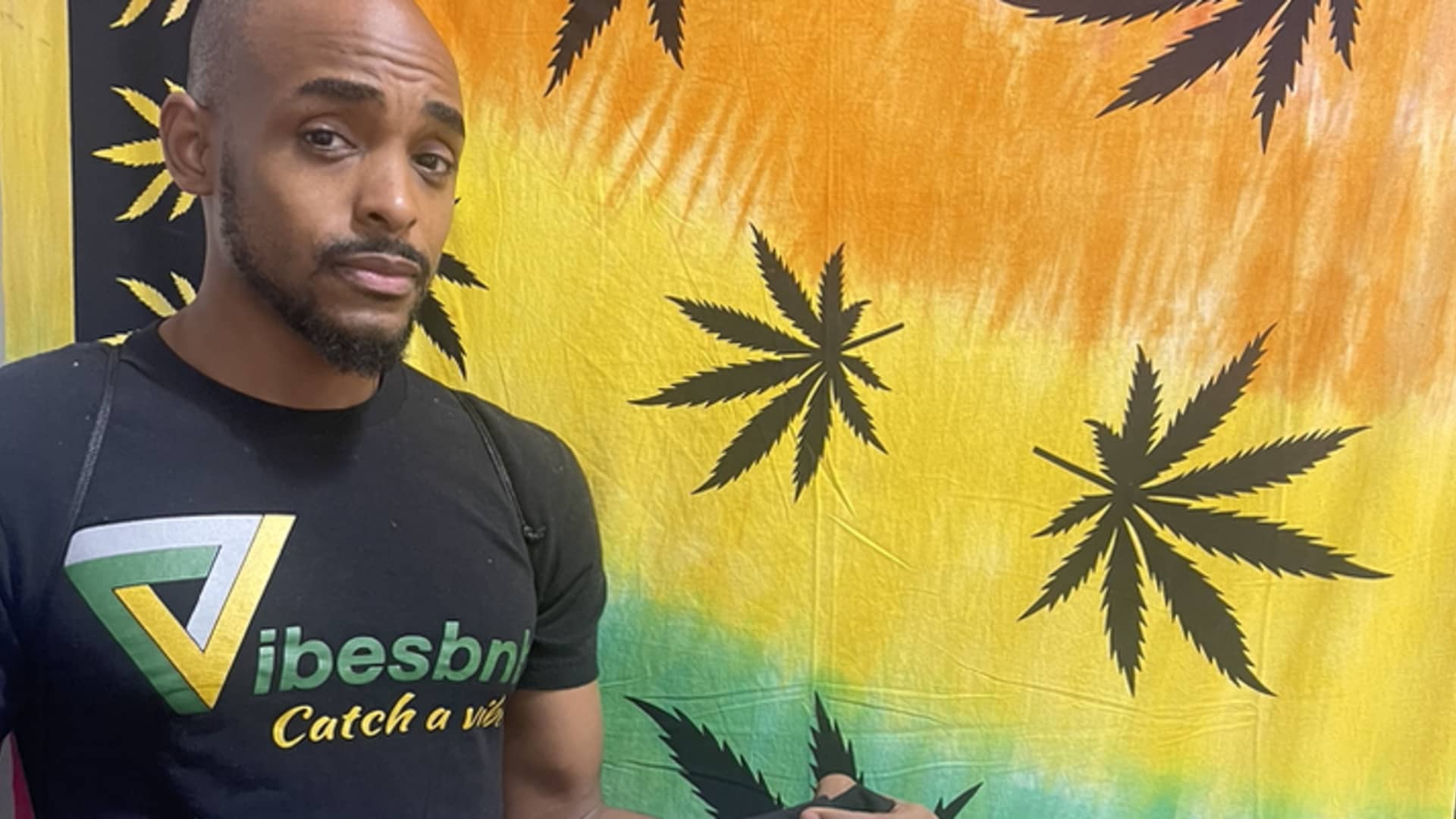Cannabis vacation rentals are becoming more popular
At her bed and breakfast, Nicole Butler hosts potlucks in her backyard with THC-infused food.
Photo: Nicole Butler
At Nicole Butler’s bed-and-breakfast, the cannabis is in the sweets that greet guests at check-in, the homemade shrimp and grits and other meals she serves, and the snacks she bakes for all those with cravings.
“I really just tried to give people what they’re used to, just with the added element of cannabis,” Butler said.
With permission from her landlord, Butler in 2018 began listing her 3-bedroom, 3-bathroom townhouse in Washington, D.C. on BudandBreakfast.comthat connects travelers with hosts who allow the use of marijuana on their properties.
The site is still tiny, with just 2,000 active listings compared to Airbnb’s 6 million. But there is growing interest in the niche market for cannabis-friendly accommodations, with recreational marijuana use now legal in 19 states and Washington. Cannabis tourism at large is also now a $17 billion industry, according to recent data from Forbes.
Some cannabis-friendly rental hosts go beyond just allowing smoking or consuming weed on-site. With rooms starting at $420 per night, for example, Butler offers a well-stocked cannabis bar with a variety of strains to choose from as well as yoga, CBD massages and cannabis education.
A hairstylist before the pandemic, Butler started running the bed-and-breakfast full-time when the salon she worked in closed during the pandemic. She said the company started to hold after about a year.
“I think the pandemic has made people really appreciate experiences, self-care, and just doing things that make them feel good,” Butler said.
A growing trend
Cannabis sales in the United States are expected to grow from $25 billion in 2021 to $42 billion in 2026, according to cannabis market research firm BDSA.
Sean Roby, who started BudandBreakfast.com in 2015, is among those looking to capitalize on the growing industry. Owners can list their properties for short-term reservations in states where the recreational or medicinal use of cannabis is legal. When he first launched the site, Roby said his business partners doubted people would buy into the idea of letting guests smoke cannabis on their properties.
“We get dozens of bookings a day now,” he said.
On the site, there are listings of where smoking is allowed in the house, whether cannabis will be provided, or whether it’s bring your own bud. They also include information about local dispensaries and cannabis-friendly events happening in the area.
“We have places that are reserved six months in advance,” Roby said.
Deontae Mack also courted guests with her online startup Vibesbnb.com, where it lists cannabis-friendly rentals. The site has more than 150 listings, mostly in Florida, and Mack said about 2,000 users signed up in the first year.
Florida, one of the top vacation destinations in the United States, still does not allow recreational cannabis use. But after voters approved a bill in 2016 allowing medical use on private property, Mack, an Uber and Lyft driver at the time, saw an opportunity to make some money.
“People don’t want to be inconvenienced when they smoke, and some actually have medical needs,” Mack said. “But when people travel to Florida, if they smoke for any reason, the only place they can do it is in a private residence.”
Mack cross-lists on Vibesbnb and Airbnb. He said people could either book one of his listings on Airbnb or go directly to his site for a cheaper booking.
Deontae Mack, Founder and CEO of Vibesbnb
Courtesy: Deonte Mack
According to Airbnb community policy, possession and consumption of cannabis is permitted “where it is legal and does not violate any house rules”. However, the company does not allow users to directly search for cannabis-friendly rentals, or allow its hosts to list their rentals as such.
“If a guest is curious about a host’s cannabis rules in their listing, we encourage guests to contact the host prior to booking to ask for more information,” Airbnb said in a statement. a statement.
Mack pitched his plans for Vibesbnb to investors in 2019 after successfully listing his, and then other apartments he’s rented, as cannabis-friendly staycations on sites including Airbnb and Vrbo. He circumvented the site’s rules by putting “420 friendly” in the description, which allowed people to find him via Google searches.
“I’m trying to become like the Airbnb of cannabis in Florida,” Mack said.
Collection
The move from the cannabis industry to the mainstream caught the attention of Jeremiah Swain while he was a student at Cornell University’s School of Hospitality Administration.
“There are so many opportunities that the black community is missing out on because of their traumatic response to marijuana, because of this traumatic history with the plant,” Swain said.
Swain and his classmate Cameron Wesley Scott founded a cannabis research company in Ithaca, New York. Swain said he hopes it will become one of upstate New York’s premier cannabis boutique hotels, with about 65 rooms.
“We’re looking at mid to late 2025, depending on how quickly we close our fundraising,” he said.
Construction hasn’t started, but he said he envisions an atrium-style area with live plants, spas, and art and yoga studios.
For now, the couple are growing cannabis for the adult recreational market in New York State through their 8th Wonder Cannabis Company. They received $300,000 in angel investment, but continue to fundraise to build the hotel.
Left to right, Cameron Wesley Scott and Jeremiah Swain
Photo: Jesse Winter
Swain said the hotel, which he called “the nexus between cannabis and hospitality,” will be what allows minority entrepreneurs like him to break into the industry.


Comments are closed.